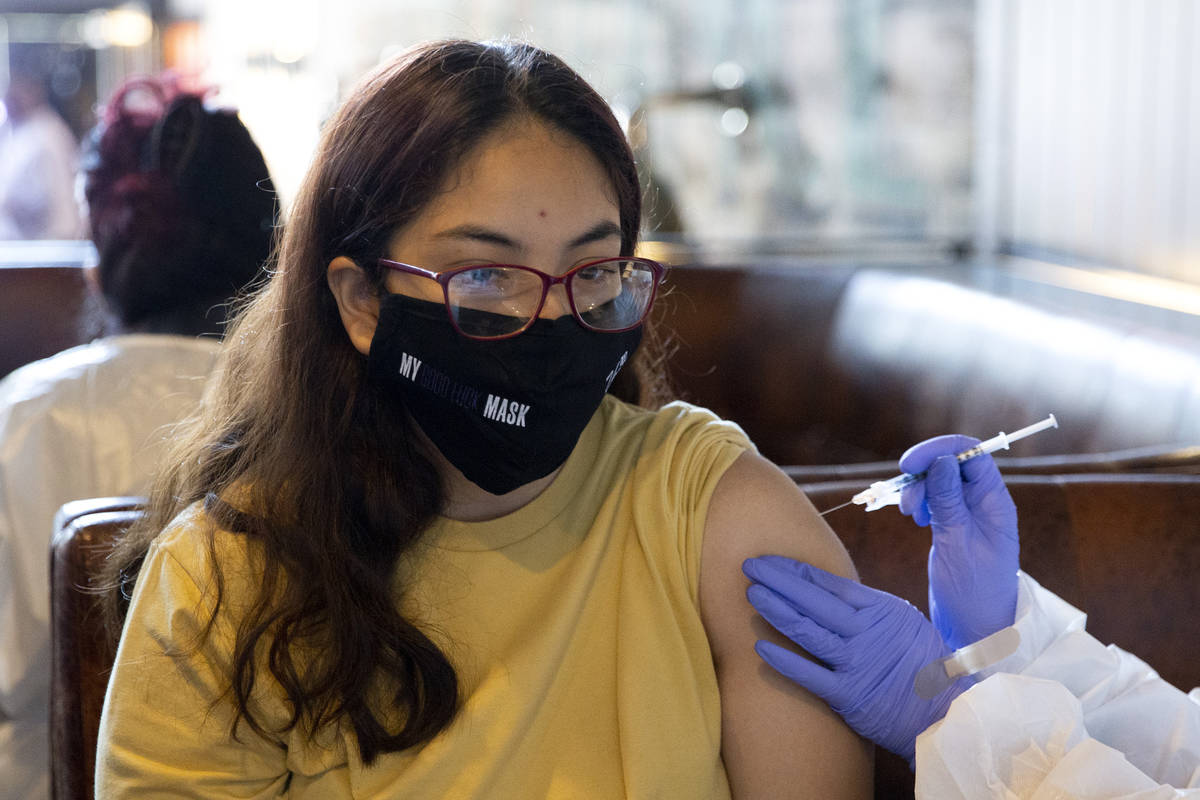COVID vaccine myths: Here’s what you should know
U.S. Surgeon General Vivek Murthy said Thursday that misinformation about the COVID-19 pandemic poses an “imminent and insidious threat to our nation’s health.”
He condemned the spread of what he called “common myths” by those who are refusing to get vaccinated. Nevada health officials said cases in unvaccinated people are driving the state’s recent infection spike.
Murthy’s office also released a document showing ways to counter COVID-19 vaccine misinformation. Find that here.
The Centers for Disease Control and Prevention has addressed some of the myths circulating primarily through social media channels and published facts people should know to combat vaccine concerns.
Myth 1. Receiving a COVID-19 vaccine can cause you to be magnetic.
CDC: Receiving the vaccine will not make you magnetic, including at the vaccination site in your arm. COVID-19 vaccines do not contain ingredients that can produce an electromagnetic field at the injection site. All COVID-19 vaccines are free from metals. Find out more about ingredients in vaccines authorized for use in the United States.
Myth 2. The COVID-19 vaccine can cause problems if you would like to have a baby.
CDC: If you are trying to become pregnant now or want to get pregnant in the future, you may get a COVID-19 vaccine when one is available. There is currently no evidence that the vaccination causes any problems with pregnancy, including development of the placenta. In addition, there is no evidence that female or male fertility problems are a side effect of any vaccine, including COVID-19 vaccines.
Myth 3. The vaccine will alter your DNA.
CDC: The vaccines do not change or interact with your DNA in any way. Both mRNA and viral vector COVID-19 vaccines deliver instructions (genetic material) to our cells to start building protection against the virus that causes COVID-19. However, the material never enters the nucleus of the cell, which is where our DNA is kept. Find out more about mRNA and viral vector COVID-19 vaccines.
Myth 4. Getting a COVID-19 vaccine will cause me to test positive for COVID-19 on a viral test.
CDC: None of the authorized and recommended COVID-19 vaccines cause you to test positive on viral tests, which are used to see if you have a current infection. If your body develops an immune response to vaccination, which is the goal, you may test positive on some antibody tests. Antibody tests show you had a previous infection and that you may have some level of protection.
Myth 5. The vaccine can make you sick with COVID-19.
CDC: None of the authorized COVID-19 vaccines in the United States contain the live virus. This means that a vaccine cannot make you sick. The vaccines teach our immune systems how to recognize and fight the virus.
Myth 6. Being near someone who received a COVID-19 vaccine can affect a woman’s menstrual cycle.
CDC: A menstrual cycle cannot be affected by being near someone who received a COVID-19 vaccine. The cycles can be affected by stress, sleep problems and changes in diet or exercise.
Myth 7. COVID-19 vaccines authorized for use in the United States shed or release some of their components.
CDC: Vaccine shedding is the term used to describe the release or discharge of any of the vaccine components in or outside of the body. Some have believed the live virus can be shed from those vaccinated. Vaccine shedding can only occur when a vaccine contains a weakened version of the virus. None of the vaccines authorized for use in the U.S. contain a live virus.
Myth 8. If you already had COVID-19, you don’t need to get the vaccine.
It’s true that if you recover from COVID-19, your body will produce antibodies that offer some level of protection against getting it again. Ninety days is an estimate of how long immunity from natural infection may last, though it could be longer, said Dr. David Weismiller, a professor in the UNLV School of Medicine’s Department of Family and Community Medicine. But vaccines are still needed to augment the protection.
Jennifer Sizemore, Southern Nevada Health District spokesperson, said this is one of the most common misconceptions the agency hears.
“This is not the case. People who have had COVID-19 are still at risk for reinfection, and vaccination provides the best, most effective protection for people who have recovered from the virus,” she added.
The Wall Street Journal reported last week that a growing body of research shows infection and inoculation both elicit an immune response against Covid-19 that lasts for months and possibly years, but the variants present risks. Full vaccination is the best protection.
Myth 9. The COVID-19 vaccines are causing COVID-19 variants.
The COVID-19 virus itself, not the vaccines, produces the variants. The CDC states viruses change constantly and the genetic variations can lead to the emergence of new variants. Read more about variants here.
Myth 10. I’m young and healthy, I don’t need the vaccine.
Being young and healthy doesn’t guarantee immunity against the disease, especially with the more-contagious delta variant spreading in Southern Nevada and across the U.S., the CDC and other public health experts say. Anyone who catches the virus can develop debilitating long-term symptoms, including prolonged shortness of breath, brain fog, fatigue, and loss of smell or taste. Some younger people have died from COVID-19, including those who were completely healthy.
Need to get a vaccine, find options here. For testing options, go here.
Find the latest data about the coronavirus numbers in Nevada here.
Read more about vaccine safety at the CDC site.
Have questions? Send them to vaccinequestions @reviewjournal.com
Rhonda Prast is the Review-Journal’s investigations and projects editor. Reach her at rprast@reviewjournal.com. Review-Journal staff writer Mary Hynes contributed to this report.











































